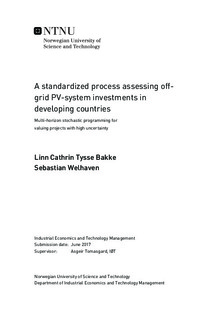| dc.description.abstract | This thesis is written in cooperation with SunTap, as a step towards their goal of becoming an important actor in the market for electrification of Uganda using solar technology. More than 80\% of the population in Uganda live in rural areas, and the vast majority without access to electricity. The country's geographical location makes it preferable for utilization of energy from the sun, and off-grid PV-systems are therefore regarded as attractive investments. A general processes for assessing the value of investments in off-grid PV-systems in developing countries does however not exist. Therefore, we have developed a standardized process for assessing these types of projects from a private investor s perspective. Further, we utilize the process developed to assess the investment opportunity that a mini-grid placed in a small village in Uganda can be for SunTap.
Uncertainty can be of great importance for the value of a project. To incorporate this in the project evaluation, our standardized process initially assesses fundamental questions essential for project success, before a risk analysis is proposed as a way to appropriately identify, assess and respond to risks. Utilizing the information obtained in these assessments in a stochastic program, based on a multi-horizon stochastic structure combined with a discounted cash flow analysis, the expected net present value of the project can be calculated. Further, both required return on equity and Conditional Value-at-Risk are separately implemented in the stochastic program as two ways for the investor to apply subjective risk measures on the investment.
Through the case study it becomes evident that the standardized process is a useful tool for private investors when assessing investments in off-grid PV-system projects located in developing countries. The results from the case study show that the investment opportunity assessed has a positive expected net present value. However, this value is highly influenced by the amount of grants awarded for the project and the subjective assessment of project risk made by the investor. Requirements concerning high shares of demand covered by solar powered electricity also result in a negative expected net present project value. For the case studied, the strategic uncertainty incorporated in the stochastic program provides a low value of stochastic solution. By incorporating additional long-term uncertainties, this effect can however be avoided. | |

